Below is a copy and recording to my sermon for today (the recording was made on Friday, October 23, at Mayberry Church, so it might not be exactly the same as the text). The text is found below the .embedded video.
Jeff Garrison
Bluemont and Mayberry Churches
October 25, 2020
Matthew 22:15-40
At the Beginning of the Service: This morning we’re going to again dig into Matthew’s gospel. I’ll stay with Matthew for the next several weeks.
The 22nd. Chapter, from which I preached last week and will again look at this week, along with the 23rd Chapter, are a block of teachings that marks the end of Jesus’ earthly ministry. In these two chapters, Jesus teaches the crowds during his last week in Jerusalem. But at the end of this teaching, Jesus leaves the temple with his disciples. From that point on, the teaching Jesus did that’s recorded in Matthew’s gospel was done privately with the disciples.
Matthew begins Jesus’ ministry, after the baptism, with 40 days of fasting that ends with three temptations by the devil in the wilderness. Jesus’ ministry ends with three questions asked by those who would also attempt to trick Jesus.[1] But Jesus didn’t fall for the temptation or for the trick questions as he constantly focused on God in heaven.
Our text today ends with Jesus’ double love commandment: love God and love your neighbor. I encourage you to spend some time this week thinking about how the double love commandment might help us, as Christians, heal the world.
After the Scripture Reading: Before I get too far into the sermon, let me make it clear that I’m not a big fan of professional wrestling. I don’t like the hype, the bragging, the fakery, or much of anything else about it. However, I admit, it can be entertaining and there have been a few times that I’ve gotten sucked in and found it humorous.
Don’t you like how they set up the characters on the mat. One fighter represents good and the other evil, a symbolic Armageddon. It’s also interesting how they do tag team wrestling, where one guy who is getting pounded can, before he’s down, reach out and tag another dude who takes over the fight.
Jesus might have felt he was a team of one against a group of tag-team wrestlers. First in the ring are the Herodians and the Pharisees.[2] Politics, it’s said, makes strange bedfellows and that’s the case here. These two groups wouldn’t normally speak to each other, but they come together against Jesus, asking him about paying taxes.[3] Jesus’ answer, give to Emperor what is the Emperors, stumps them. They run out of the ring and tag the Sadducees who step up and ask Jesus a trick question about marriage in the afterlife. This is ironic, as the text points out, since the Sadducees don’t believe in an afterlife.[4] In the Greek, Jesus’ answer to the Sadducees was to “muzzle” them,[5] which is a little stronger than the English translations that read, “He silenced them.” Think of muzzling a dog! Sounds like a pro-wrestling stunt, doesn’t it?
As I said earlier, our reading somewhat parallels the fourth chapter of the gospel, where Jesus is tempted in the wilderness. In the fourth chapter, Jesus answers the temper’s challenges with three God-centered responses. Here, Jesus also answers those who question and test him three times with God-centered responses. First, with the question from the Herodians and Pharisees concerning the paying of taxes, Jesus approves paying taxes, but since, as the Jews would have known, God owns everything,[6] he shrewdly makes the case that all belongs to God. Then, in a question over the resurrection, Jesus reminds us that God has power over even death.
Finally, Pharisee climb back into the ring for one final challenge, a question about the law. Which commandment is the greatest? It’s a trick question.
Jesus doesn’t directly answer the question. There’s good reason. Had Jesus picked one of the Ten Commandments, he’d be stepping into their trap, for the commandments are equal. They’re all important; you can’t grade yourself by looking at the Ten and thinking that because you’ve kept seven, you’ll get a passing grade of 70. That doesn’t work. Jesus knew what they were getting at, so he answers in a way that goes to sum of the commandments, by drawing from Scripture two teachings that other teachers had seen as foundational.[7]
Yoking together the love of God and of neighbor summarizes our purpose as members of the human race. As the Westminster Catechism so beautifully begins, we’re to glorify and enjoy God forever. We do this by loving God and our neighbors (and we can’t forget, as Jesus teaches, that our neighbors are not just those who live next door. Remember the Good Samaritan?[8]). As humans, we are made to love.
Too often we think of love in the context of affection. We think of love as an emotional rush we get when we are attracted to another. That’s not the meaning of Biblical love. Yes, we can be emotional when we think of all that God has done for us, but the passage Jesus quotes on loving God with all our hearts and souls and minds doesn’t mean that we have to be all mushy about who God is. Instead, what is demanded is commitment—emotionally and intellectually—to God. Likewise, it’s pretty hard for us to show affection to everyone (and probably pretty dangerous). If we tried to show such affection, we’d have a difficult time with at least two of the commandments: the seventh and tenth, adultery and coveting. We’re not called to the affectionate love of neighbors. Instead, we’re called to be committed to the well-being of our neighbors (and we can’t forget Jesus’ reminder that our neighbors include our enemies[9]).
By tying together our heart, soul and mind, Jesus implies that our love for God has to be total. It’s not enough to be emotionally in love with God, nor is it enough to be intellectually in love with God. We got to have both! We need to be holistic and love with the entirety of our being.
Dr. Robert Smith, Jr., a preaching professor at Beeson Divinity School tells about how he sometimes finds himself preaching to “beheaded people.” They’ve lost their heads; they’re only engaging God with their hearts, he says. They come to worship wanting the equivalent of a therapy session.” In other congregations, and sometimes in the same church, he finds himself preaching to “big-headed people.” They’re into scholarship and all they want is to have the gray matter in their minds massaged.[10]
Both groups, Smith points out, miss the richness of the gospel. We’re to love God with all our hearts and souls and minds. Our love for God is to be holistic and we’re to be led out from it, not only feeling good about our neighbors but to take their needs seriously and working for their well-being.
There are times I think my calling is the best job in the world. I know John Calvin suggested that the magistrate, whom we call politicians, had the highest calling. I had to bring in Calvin as today is Reformation Sunday.[11] Of course, Calvin was writing back in the 16th Century. I’m not sure he’d approve of any of our politicians today.
Maybe I’m running the risk of pride to think so highly of the call of the pastor, but the pastor/preacher gets to spend time with people and also time with ideas. To do it well (and I know there are times I don’t do it well), one has to balance these two sides—the emotional side with the intellectual. Otherwise, we go off into a philosophical head game or into sentimentalism. There has to be a balance.
Jesus’ double-love commandment has the power to heal the church and from the world. Too often, Christians get stuck on one side or the other of the equation. We love God so much and we get down on those who don’t praise God like we do. We think there must be something wrong with those people. And then, there are those on the other side, who feel so committed to looking out for their neighbors that they forget about God. What Jesus says here is that you can’t have it one way or another, it’s not either/or, it’s both/and.
Let me say something about the last half of Jesus’ response. We’re to love our neighbors asourselves. The word “as” is important. Jesus is not giving us a new commandment here, instead he’s reflecting back on the Golden Rule.[12] How should we treat others? As we want to be treated! How should we love others? As we love ourselves, or as we want others to love us?
How should we apply the double-love commandment? Consider your lives. Are you more emotional? If so, you might be the type of person who enjoys mission work, or helping out a neighbor, or taking food to someone ill. If so, keep doing that! But you also might want to look at balancing such activities with some intellectual exercises, a commitment to read Scripture or to join a Sunday School class or to read a theology book.
On the other hand, if God is an intellectual exercise for you, then you might need to get in touch with your emotional side. Join in a work party or volunteer to help a neighbor, visit those who are struggling with life.
As a follower of Jesus, we should strive for a balanced life. Not only do we fulfill Jesus’ call, it keeps us from burning out.
This morning, ask yourself, “Does my whole being glorify God?” If not, what might you do to balance your faith?
Living a balanced life will be helpful to us, and also to the world. If we love God and neighbor, we just might change the world a little bit for the better.
Let all of us commit ourselves by saying together: “May the love of God and the love of our neighbors begin with me.” Amen.
c2020
[1] Scott Hoezee, “Back to the Beginning” https://cep.calvinseminary.edu/sermon-starters/proper-25a-2/?type=the_lectionary_gospel
[2] Not much is known about the Herodians, but it’s obvious they are supporters of the Herod dynasty that ruled much of ancient Israel and Syria on behalf of the Romans. The Herod clan, who were part Jewish, tried to stay on the good side of both the Jews and the Romans. However, most Jews disliked them because of their ties to the Romans.
[3] Matthew 22:15-22.
[4] Matthew 23-33
[5] Frederick Dale Bruner, The Churchbook: Matthew 13-28 (Grand Rapids: Eerdmans, 2004), 410.
[6] Psalm 24:1.
[7] Douglas R. A. Hare, Matthew: Interpretation, a commentary for teaching and preaching (Louisville: John Knox Press, 1993), 259. Jesus quotes from Deuteronomy 6:5 and Leviticus 19:18.
[8] Luke 10:25-37.
[9] See Luke 10:21ff and Matthew 5:43-47.
[10] Robert Smith, Jr., Doctrine that Dances: Bringing Doctrinal Preaching and Teaching to Life (Nashville: B&H, 2008), 51.
[11] Reformation Sunday is traditionally the Sunday before Reformation Day (October 31). Reformation day, the day before All Saint’s Day, is when Martin Luther nailed the 95 Thesis on the door of the church in Wittenberg and is considered the beginning of the Reformation.
[12] Matthew 7:12


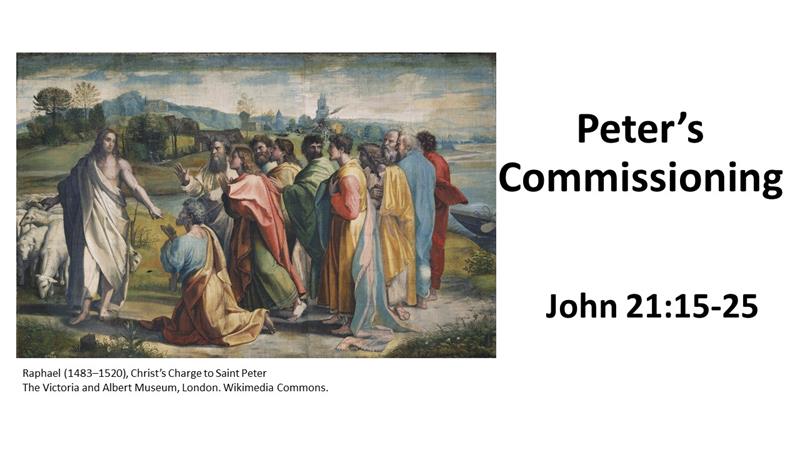
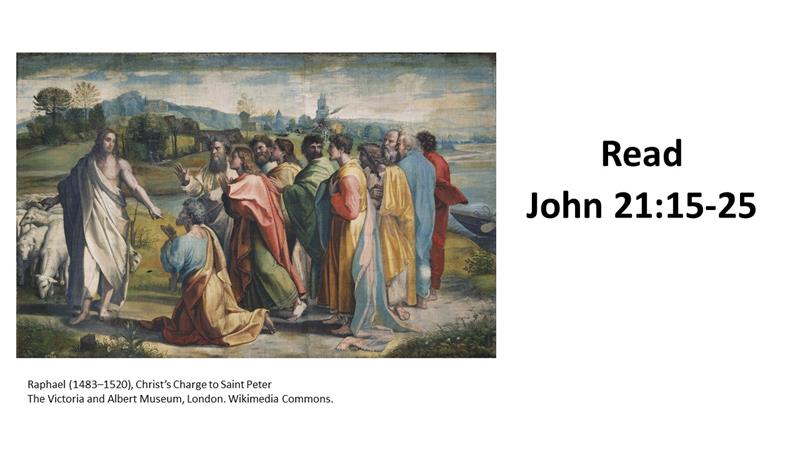
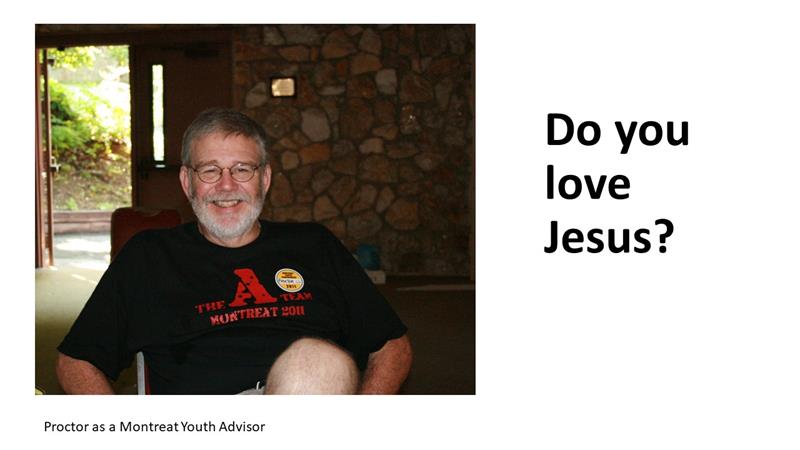 Some of you may know the Reverend Proctor Chambless. He’s a retired minister member of the Savannah Presbytery, and has served a number of congregations within our presbytery and across the South. When I came to this presbytery, Proctor was serving an interim position in another presbytery upstate. He wasn’t here. During the first person examined for ordination as a Minister of the Word and Sacrament at Presbytery, someone stood up and said that since Proctor wasn’t present, he was going to ask Proctor’s question. The question: “Do you love Jesus?” The presbytery, as a body, snickered. I realized I wasn’t in on the joke. I asked someone about this and was told that Proctor always asked that question. When Proctor returned, I figured out who he was before I met him. We had another candidate to examine and Proctor stood and asked this question. It’s kind of a fun thing. The rest of us are thinking probing questions to prod the examinee on the fine points of Reformed Theology, as Proctor, with his deep southern drawl, asks the essential question. “Do you love Jesus?” That’s the question Jesus asks Peter three times. And it’s a question we’re all to ask ourselves. Furthermore, as we’re going to see when we delve into this text, there is one way of knowing that we love Jesus. Do we care for others?
Some of you may know the Reverend Proctor Chambless. He’s a retired minister member of the Savannah Presbytery, and has served a number of congregations within our presbytery and across the South. When I came to this presbytery, Proctor was serving an interim position in another presbytery upstate. He wasn’t here. During the first person examined for ordination as a Minister of the Word and Sacrament at Presbytery, someone stood up and said that since Proctor wasn’t present, he was going to ask Proctor’s question. The question: “Do you love Jesus?” The presbytery, as a body, snickered. I realized I wasn’t in on the joke. I asked someone about this and was told that Proctor always asked that question. When Proctor returned, I figured out who he was before I met him. We had another candidate to examine and Proctor stood and asked this question. It’s kind of a fun thing. The rest of us are thinking probing questions to prod the examinee on the fine points of Reformed Theology, as Proctor, with his deep southern drawl, asks the essential question. “Do you love Jesus?” That’s the question Jesus asks Peter three times. And it’s a question we’re all to ask ourselves. Furthermore, as we’re going to see when we delve into this text, there is one way of knowing that we love Jesus. Do we care for others?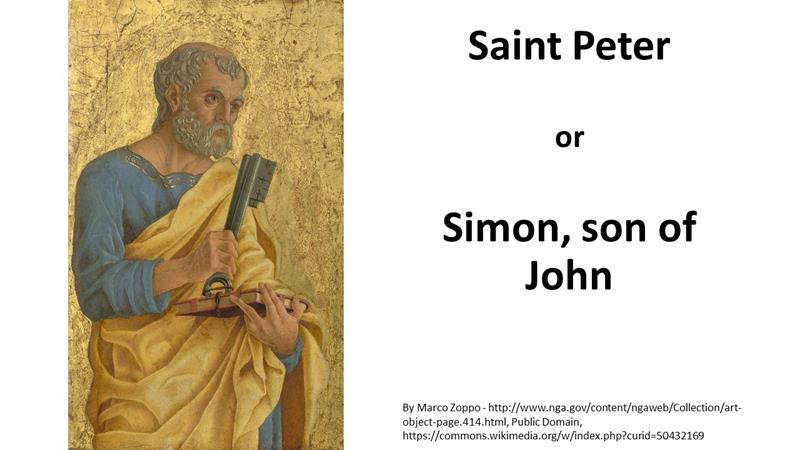 Jesus uses his full legal name. “Simon, son of John.” Did any of you have parents, or maybe a teacher, who when you were in trouble, would use your full name? “Charles Jeffrey!” I would hear that and immediately knew I had done something wrong. Was Peter in trouble? I don’t think so. But Jesus emphasizes the importance of his questioning. When someone uses your full name, it grabs your attention. Jesus asks Peter if he loves him more than these. We can assume Jesus is pointing over toward the other disciples. We’re told that Peter, in two of the gospels, brags at the Last Supper about how much more he loves Jesus than the others, so much so that he’ll never abandon Jesus.
Jesus uses his full legal name. “Simon, son of John.” Did any of you have parents, or maybe a teacher, who when you were in trouble, would use your full name? “Charles Jeffrey!” I would hear that and immediately knew I had done something wrong. Was Peter in trouble? I don’t think so. But Jesus emphasizes the importance of his questioning. When someone uses your full name, it grabs your attention. Jesus asks Peter if he loves him more than these. We can assume Jesus is pointing over toward the other disciples. We’re told that Peter, in two of the gospels, brags at the Last Supper about how much more he loves Jesus than the others, so much so that he’ll never abandon Jesus.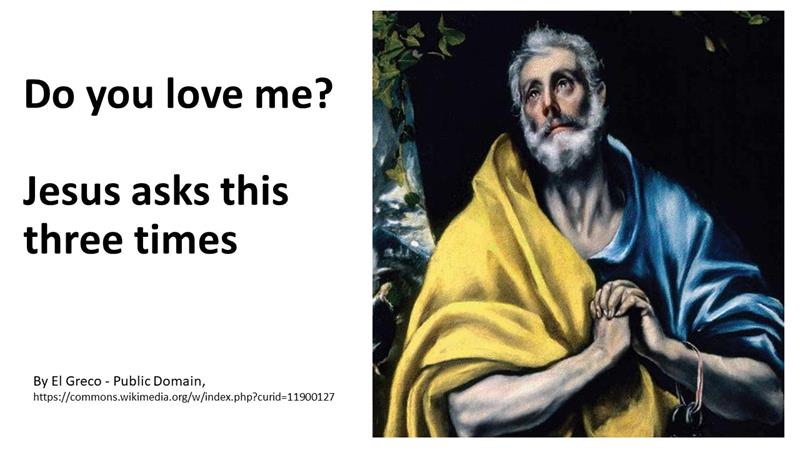 Now, after everything that has happened—the betrayal, the crucifixion, the resurrection—Jesus asks if Peter really does love him and, of course, Peter responds positively. “Yes, Lord, you know that I love you.” Jesus then tells Peter to feed his lambs. This questioning goes on for three times, with just slight variations.
Now, after everything that has happened—the betrayal, the crucifixion, the resurrection—Jesus asks if Peter really does love him and, of course, Peter responds positively. “Yes, Lord, you know that I love you.” Jesus then tells Peter to feed his lambs. This questioning goes on for three times, with just slight variations. We’re not given a sense of just how this prediction of Peter’s death was received, but Peter must have pondered it, for he asks about another of the disciples. Jesus tells Peter a great truth. “Don’t worry about him and his death.” It’s almost as if Jesus is saying, “You have enough troubles. Don’t worry about what God seems to give someone else to worry over.” In other words, accept God’s gift as grace and be thankful.
We’re not given a sense of just how this prediction of Peter’s death was received, but Peter must have pondered it, for he asks about another of the disciples. Jesus tells Peter a great truth. “Don’t worry about him and his death.” It’s almost as if Jesus is saying, “You have enough troubles. Don’t worry about what God seems to give someone else to worry over.” In other words, accept God’s gift as grace and be thankful. Here we are, fifty or so generations Peter.
Here we are, fifty or so generations Peter. During these trying times, when we are hiding out in our homes, we might wonder how we can help anyone. There are ways. The Session, at the request of the Mission and Benevolence Committee, has called for a special offering to help care for the homeless in our community. Do what you can to help. The homeless ministries of Savannah are struggling to meet the needs of those who live under the bridges and on the streets.
During these trying times, when we are hiding out in our homes, we might wonder how we can help anyone. There are ways. The Session, at the request of the Mission and Benevolence Committee, has called for a special offering to help care for the homeless in our community. Do what you can to help. The homeless ministries of Savannah are struggling to meet the needs of those who live under the bridges and on the streets.
 Jeff Garrison
Jeff Garrison 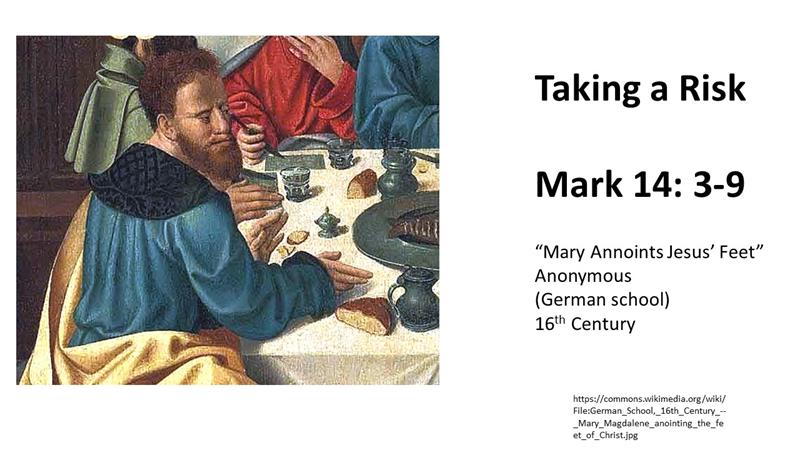 None of us are happy with the way things are going in Jerusalem. It’s not just the political oppression. We’re troubled by the dire situation of the hungry, the poor, the sick, and the disturbed. The Roman’s don’t’ care about them? At least we try. Every penny we scrape up we try to pass on to those who need it. Before Jesus arrived for dinner, some of us were also wondering if we should save some money in case we needed to hide out in the not-too-distant future.
None of us are happy with the way things are going in Jerusalem. It’s not just the political oppression. We’re troubled by the dire situation of the hungry, the poor, the sick, and the disturbed. The Roman’s don’t’ care about them? At least we try. Every penny we scrape up we try to pass on to those who need it. Before Jesus arrived for dinner, some of us were also wondering if we should save some money in case we needed to hide out in the not-too-distant future.
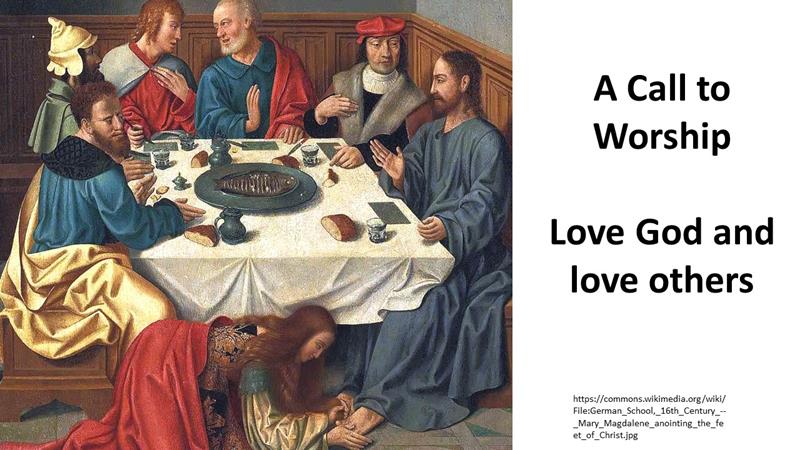 There are two big meals highlighted in the final week of Jesus’ earthly ministry.
There are two big meals highlighted in the final week of Jesus’ earthly ministry.

 Now consider the risks this woman takes. She shows up uninvited. She shocks the guests with her generosity. Ever give a gift and wonder and worry if it would be accepted? Her gift does upset those around the table. Why isn’t this money being given to the poor? They ask. Jesus’ protects her dignity, saying she’ll be remembered because of what she’s done. And Jesus doesn’t stop there. He goes on to say we’ll always have the poor, but he won’t be around long, at least not in person.
Now consider the risks this woman takes. She shows up uninvited. She shocks the guests with her generosity. Ever give a gift and wonder and worry if it would be accepted? Her gift does upset those around the table. Why isn’t this money being given to the poor? They ask. Jesus’ protects her dignity, saying she’ll be remembered because of what she’s done. And Jesus doesn’t stop there. He goes on to say we’ll always have the poor, but he won’t be around long, at least not in person. In Matthew’s gospel, we’re told that helping the poor and needy, the sick and the prisoner, is the same as helping Christ,
In Matthew’s gospel, we’re told that helping the poor and needy, the sick and the prisoner, is the same as helping Christ, What can we do? We certainly can’t heal the world, just as the woman couldn’t keep Jesus off the cross. But what kind of risk might we take for Jesus? Things are changing so rapidly around us. It’s scary. But we need to remember, this is not the first time Christ’s church has witnessed pestilence. In the 14th Century, a large percentage of the population died from the plague, but at the same time Great Cathedrals were being built.
What can we do? We certainly can’t heal the world, just as the woman couldn’t keep Jesus off the cross. But what kind of risk might we take for Jesus? Things are changing so rapidly around us. It’s scary. But we need to remember, this is not the first time Christ’s church has witnessed pestilence. In the 14th Century, a large percentage of the population died from the plague, but at the same time Great Cathedrals were being built. This woman might be seen as a fool for Christ. She faced ridicule, but Jesus protected her dignity and honored her. Don’t be afraid to be a fool for Christ. For our Master will take care of us. Amen.
This woman might be seen as a fool for Christ. She faced ridicule, but Jesus protected her dignity and honored her. Don’t be afraid to be a fool for Christ. For our Master will take care of us. Amen.